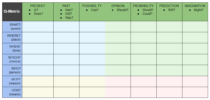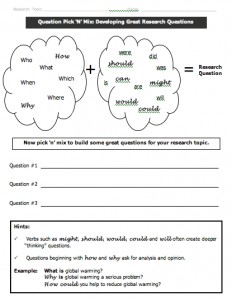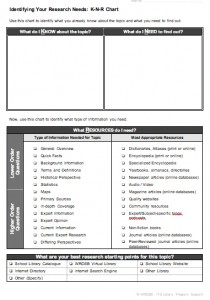Once you have identified your topic and potential sub-topics, what questions do you have? Asking good questions is key to getting good answers.
Lower Order Questions
Some questions are designed to help you find and understand the basic information – to get your facts straight. They help you to understand a topic more thoroughly. This type of questioning is essential for understanding the basics of your topic.
Higher Order Questions
Some questions help you to take apart the information you have found, explore different aspects of the problem, see varying points of view, and develop your own opinions. Exploring these critical thinking questions will take your research to the next level.
Asking Good Research Questions
Here’s how it works. As you move down the chart, the type of questions move from lower order (basic but essential understanding) to higher order (critical thinking) questions.
| Type of Question | This type of question would use verbs like… | Example |
|---|---|---|
| Knowledge: Identifying or recalling information. | Describe, identify, outline | What countries were allies of Britain during WWII? |
| Comprehension: Organizing, selecting and understanding facts and ideas. | Explain, define, summarize | What were the main causes of WWII? |
| Application: Applying known facts, rules and principles to new situations. | Compare, contrast, demonstrate | How did Hitler demonstrate the qualities of a dictator? |
| Analysis: Taking information apart to understand it more deeply. | Analyze, interpret, infer | Why did people follow Hitler so readily? |
| Synthesis: Bringing different ideas together to create new ideas. | Create, predict, design, develop | What would happen if Hitler were in power today? |
| Evaluation: Making judgements: forming and developing your own opinions. | Evaluate, judge, defend, assess, critique | Was Canada justified in entering WWII? |
Developing Questions
Use these organizers to help you to develop good research questions.
Question Matrix
 Use this question matrix to develop critical thinking questions.
Use this question matrix to develop critical thinking questions.
- Verbs such as might, should, would, could and will often create deeper “thinking” questions.
- Questions beginning with how and why ask for analysis and opinion.
Copyable Resources

Question Pick N Mix
Combine words from each cloud to develop good critical thinking questions.
Printable Resources

Research KNR
The Research KNR organizer asks you what you Know about the topic, what you Need to Know, and what Resources you think will help you to answer your research questions.
Printable Resources
Developing Questions Resources
- Download Research Questions
- Get more help with Organizing Ideas

